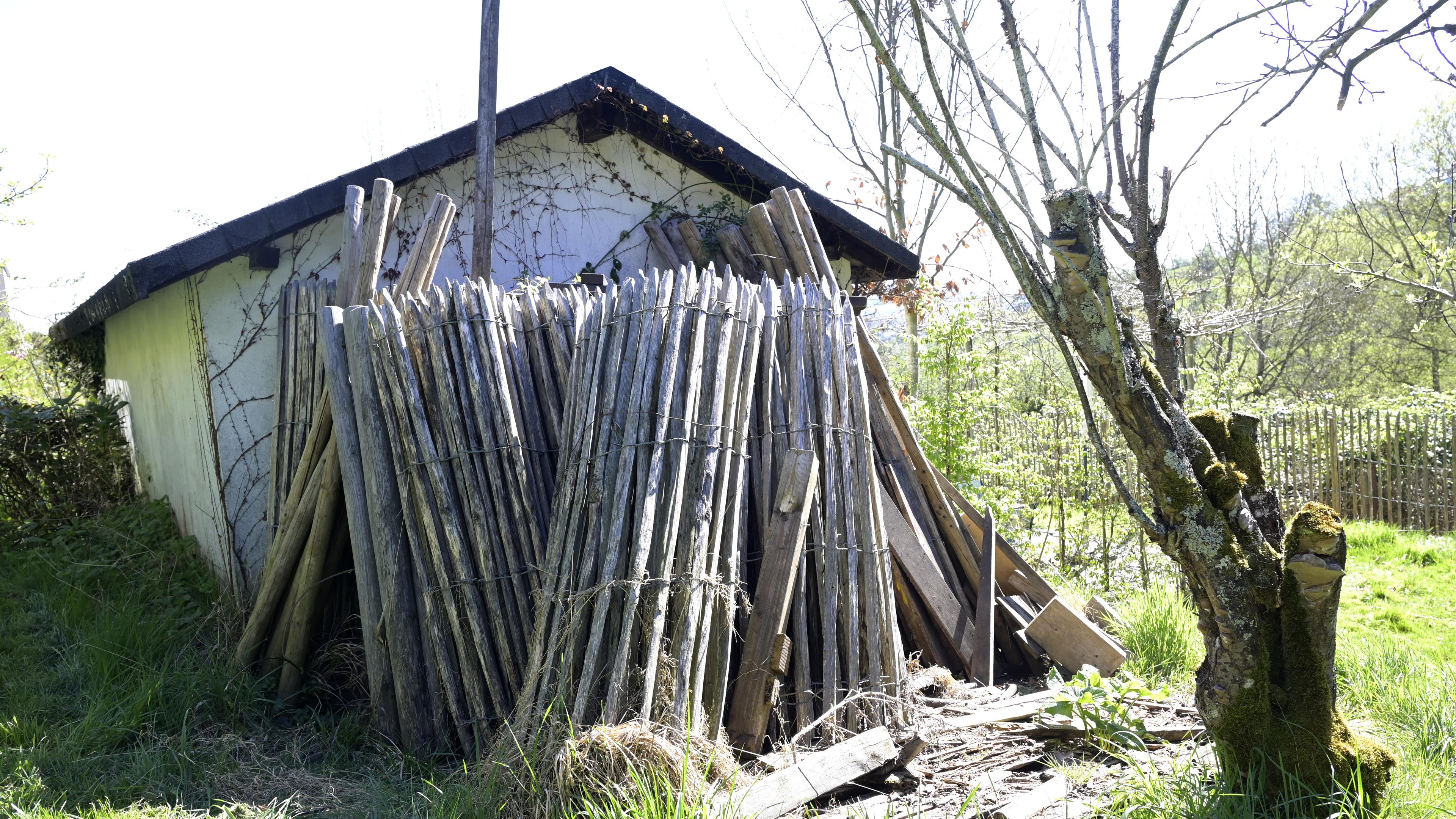The absurd small war around a garden fence

Anyone who has already submitted an application for approval at the Ministry of the Environment knows how strictly the civil servants interpret the Nature Conservation Act when it comes to activities in the green zone.
Oliver Henniges also had to experience that. The agricultural engineer and his wife wanted to build a staunch fence around her seven ark garden, which is located on the edge of a green area – on the one hand to protect their property and prevent strangers from being able to enter their property freely. But also to protect their children, the risk of injuring themselves at the strongly sloping border to the neighbor’s property on his barbed wire fence. And thirdly to protect your freshly planted fruit trees from a wildlife bite.
The Ministry of the Environment and the Little War around a hunting lodge
The choice fell on a staunch fence made of untreated chestnut wood. State fences are considered to be ecologically valuable. The open structure is permeable to small animals. Vegetation forms on the fence, which in turn offers habitats for insects. The couple were important to build an environmentally friendly fence without plastic or concrete, which also fits aesthetically well into the landscape.
The Hennige couple wanted to fence their garden to protect their property, but also so that his children do not fall against the adjacent barbed wire fence while playing. Photo: Chris Karaba
« Someone pointed out that I would need a permit for the fence, » explains Henniges when asked by the « Luxembourg word ». So he submitted an application – only with the municipality, which declared itself incomprehensibly and referred him to the Ministry of the Environment – and then in September 2021 at the Ministry of the Environment.
Ministry regarded wooden fence as a building
However, the ministry rejected its application in November 2021 – with the argument that the wooden fence was a building (construction) and such a building is only allowed in the green zone if it has a « safe and permanent connection with operational activities », for example activities of agricultural nature. That is not the case with him. It is a « leisure fence » and, according to the responsible forester, « affects the beauty of the landscape ».
The hunting lodge can now stay a hut
In January 2022, the Hennige couple submitted an extrajudicial complaint (Recours Gracieux) at the Ministry, but it was also rejected. « I thought that couldn’t be true, » says Oliver Henniges. « As an agricultural expert, I know a bit with nature conservation. For me, the arguments of the ministry sometimes seemed a bit constructed. We planted 50 fruit trees over time and I wanted to protect them from wildlife. In many nature reserves, sensitive plants are fenced in with us? There are also other ungrowns in our area. Henniges.
Oliver Hennige had already started building the fence when someone wrongly pointed out him that he needed approval. Photo: Chris Karaba
He kept looking for contact with the Ministry, suggesting meeting on site so that the officers watch the garden and the wooden fence. Vain. « It seemed to me that what shouldn’t be.
I could not imagine that politics (…) had in mind at the moment that such a harmless, beautiful fence should be banned.
Oliver Hennigen
So the couple went in court against the decision of the Environnement. « We were not really about the fence, » says Oliver Henniges. « We can also live without the fence. It was more of the feeling of encouragement. I could not imagine that the politics that decided to welcome the law in itself had in mind that such a harmless, beautiful fence should be banned. For this reason we did it in court. »
The consequent court ruling in the « House in Remich » case
In the first instance, the couple lost to the administrative court – and moved to the Administrative Court, which almost two and a half years earlier – in July 2022 – sensational and consequent judgment spoken had. The judges had given a couple to a couple who wanted to rebuild their house in the green area in Remich, but did not receive approval from the Ministry of the Environment.
Richter: Application of the Nature Conservation Act is unconstitutional
The verdict was a novelty in the case law. The judges accused the Environnement of using the Nature Conservation Act too restrictively and thus violating the constitution of violating the rule of law and human rights. The verdict was consequence in that the then Environment Minister Joëlle Welmanring (Déi Gréng) had to loosen the Nature Conservation Act.
As in the « Remich » case, in this case the Henniges couple received law after years of legal dispute. The highlight: According to the judges, the fencing of the garden with a staunch fence would not have required any approval, « since the fragile construction (chestnut piles connected to wire) did not meet the criteria of a permanent building ». In plain language: a staunch fence is not a building.
The ministry’s decision is disproportionate and incoherent
Even more. The judges believe that the ministry, with its strict interpretation of the Nature Conservation Act, violates the principle of proportionality and the statutory coherence, because: agricultural fences, even if they are built from concrete blocks in which steel piles are embedded, are not structures according to the law. « Then the much lighter and less permanent staunch fence cannot be considered as such, » the judgment says.
The refusal of approval is also disproportionate insofar as the fence does not violate the goals of the Nature Conservation Act: it does not harm nature, even serve to protect agricultural cultures and fit better into the landscape than other approval -free fences.
The Henniges couple is happy that the spook is now coming to an end. « I wouldn’t make such a lawsuit a second time, » says Oliver Henniges. The matter was too expensive and too nerve -wracking: « We do not even know whether we want to set the now heavily weathered, rolled -up fence at all. Some fruit trees have not survived the years thanks to the bite anyway and the children are now four years older. »
The couple now hopes to get the process costs reimbursed. But even if not, « I’m just glad that confidence in the rule of law has been restored here, » said the agricultural engineer.
The legal dispute could have ended prematurely
When the resulting judgment was spoken in the case of Remich in July 2022, the Henniges couple and the Ministry of the Environment were already in the legal dispute before the administrative court. However, he could have been settled on the part of the ministry, because a few months after the judgment in the « Remich » case, the then Minister of the Environment Joëlle Welminger presented the planned selective legal relaxation.
For example, fencing of private properties in green zones under certain conditions – the fencing must be permeable to animals – should be permitted without permission. Although not yet legally binding, the ministry is already using the loosening, Welfling emphasized in December 2022 when presenting the changes.
In the case of the Henniges couple, however, this did not come into play and the family had to fight through to the highest level, the administrative court – both under Déi Gréng and now under the CSV, which under the previous government vehemently for loosening and more common sense in the application of the Nature Conservation Act.
I cannot understand how the Ministry can make decisions that are fundamentally contrary to the objectives of the Nature Conservation Act.
Jean-Claude Kirpach
Lawyer and former high civil servant in the Ministry of the Environment
Only a few take the gauntlet run and complain against rejection notices of the Environnement. But the case of the couple, who wanted to rebuild their house in the green zone, and the Henniges case show that it is worthwhile to run the fight – « not for ourselves », as Oliver Hennige explains, « but for the citizens in general who are now benefiting from liberal case law ».
« No change in mentality in the Ministry of the Environment »
Jean-Claude Kirpach from the law firm Krieger & Associates represented the Henniges couple in court. « Everyone knows that important habitats arise along wooden fences and thus make a positive contribution to nature conservation, » says the lawyer and retired earlier high civil servants in the Ministry of the Environment when asked by the « Luxembourg word ». In this respect, he could not understand « how the Ministry can make decisions that are fundamentally contrary to the objectives of the Nature Conservation Act. »
What also annoys him is that the officials in the Ministry of the Environment deal with such little things as a wooden fence « and do not let go ». He is pleased that « the judges have tidy up with this small-scale view and procedure ».
The verdict is of less scope than the judgment in the Remich case when it came to the general principle of proportionality, says Sébastien Couvreur, also a lawyer at Krieger & Associates. Nevertheless, the judgment can be transferred to all small installations in the green zone such as garden greenhouses « for which the ministry asked for approval or still required, although it is smaller installations. »
The law firm does not go out for two years after the Nature Conservation Act has been relaxed. Sébastien Couvreur cannot see a change of mentality in the Ministry of the Environment. The ministry still turns the law very strictly and rejects applications that « common sense should actually approve ».








